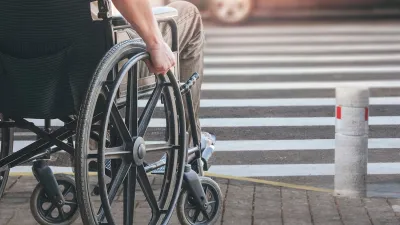How the Covid-19 pandemic taught us new ways to reclaim city streets from cars.

A new book from David L. Prytherch highlights the rapid changes made to city streets during the Covid-19 pandemic and how cities and public space advocates can build on pandemic-era success to transform American streets from vehicular thoroughfares to vibrant urban spaces. Next City published an excerpt.
Prytherch notes that, during the same time period, Americans became painfully aware of the inequity that makes even ‘open’ streets less accessible and safe for some people than others. “Though immediately focused on policing, this growing conversation encompassed a broader range of equity issues, accelerating an already robust movement for mobility justice looking beyond equity among modes to address social issues beyond the public right-of-way.”
By inviting a diversifying set of people to enter and have a stake in the roadway, and interpreting mobility justice more broadly than simply multimodal access, we come face to face with profound questions. What, exactly, do we mean by mobility justice? What and whom should public streets be for? And how ought they be shared equitably?
Prytherch explains how planners and activists must reconcile intersecting and sometimes conflicting values as they work to reclaim streets from cars and preserve the spaces created during the pandemic. “Planners struggle to balance neighborhood input, which tends to privilege the already privileged, with data-driven spatial justice. Nonetheless, these efforts to reclaim streets better approximate mobility justice than the galling inequities and unsustainability of the car-centered status quo.”
FULL STORY: Reclaiming Our Roads From Cars

Planetizen Federal Action Tracker
A weekly monitor of how Trump’s orders and actions are impacting planners and planning in America.

Congressman Proposes Bill to Rename DC Metro “Trump Train”
The Make Autorail Great Again Act would withhold federal funding to the system until the Washington Metropolitan Area Transit Authority (WMATA), rebrands as the Washington Metropolitan Authority for Greater Access (WMAGA).

DARTSpace Platform Streamlines Dallas TOD Application Process
The Dallas transit agency hopes a shorter permitting timeline will boost transit-oriented development around rail stations.

LA County Creating Action Plan to Tackle Extreme Heat
Los Angeles County is creating a Heat Action Plan to help communities stay safe during extreme heat, with steps like adding more shade, improving buildings, and supporting the neighborhoods most at risk.

Maryland Plans Quick-Build Complete Streets Projects
The state will use low-cost interventions to improve road safety in five Maryland counties.

Downtown Los Angeles Gears Up for Growth
A new report highlights Downtown L.A.’s ongoing revival through major housing projects, adaptive reuse, hospitality growth, and preparations for global events in the years ahead.
Urban Design for Planners 1: Software Tools
This six-course series explores essential urban design concepts using open source software and equips planners with the tools they need to participate fully in the urban design process.
Planning for Universal Design
Learn the tools for implementing Universal Design in planning regulations.
City of Charlotte
Municipality of Princeton
Roanoke Valley-Alleghany Regional Commission
City of Camden Redevelopment Agency
City of Astoria
Transportation Research & Education Center (TREC) at Portland State University
US High Speed Rail Association
City of Camden Redevelopment Agency
Municipality of Princeton (NJ)





























